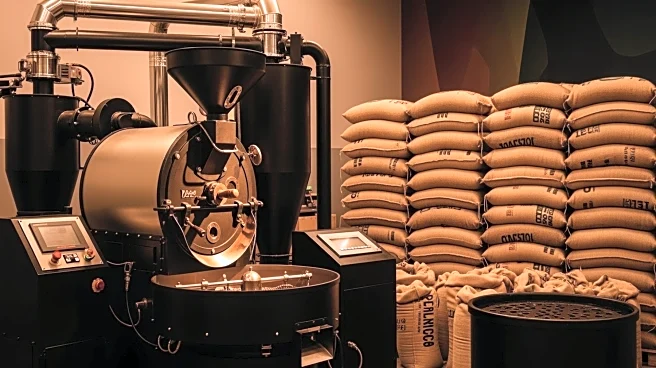What's Happening?
The Trump administration's tariffs have significantly impacted coffee roasters in the United States, leading to increased costs for both businesses and consumers. Retail coffee prices have surged by nearly
21% in August compared to the previous year, with tariffs on coffee imports from Brazil, Vietnam, and Colombia contributing to the price hikes. Brazil faces a 50% tariff, Vietnam 20%, and Colombia 10%. The U.S. imports over 99% of its coffee, primarily from these countries. As a result, coffee prices at restaurants have increased, with the average price of regular coffee rising by 10 cents to $3.52. Local coffee roasters, such as Swing's Coffee Roasters and Vigilante Coffee Company, are experiencing higher costs, which are being passed on to consumers. Some relief may be forthcoming with the introduction of the bipartisan 'No Coffee Tax Act' by Rep. Don Bacon and Rep. Ro Khanna, aiming to exempt coffee products from tariffs.
Why It's Important?
The tariffs imposed by the Trump administration are affecting the coffee industry, a significant sector in the U.S. economy. The increased costs are putting pressure on small and medium-sized businesses, which may struggle to absorb the additional expenses. Consumers are also feeling the pinch, as coffee is considered an affordable luxury, and price increases could alter consumption habits. The bipartisan effort to introduce the 'No Coffee Tax Act' highlights the political response to mitigate the impact of tariffs on coffee products. The situation underscores the broader economic implications of trade policies and their effects on everyday consumer goods.
What's Next?
The introduction of the 'No Coffee Tax Act' could lead to legislative discussions and potential changes in tariff policies affecting coffee imports. If passed, the act may provide relief to coffee roasters and consumers by exempting coffee products from tariffs. Businesses may continue to explore alternative sourcing options to manage costs, while consumers might adjust their purchasing habits in response to price changes. The ongoing economic pressures could prompt further political action and debates on trade policies and their impact on various industries.
Beyond the Headlines
The tariffs on coffee imports highlight the complex interplay between international trade policies and domestic economic conditions. The situation raises questions about the ethical implications of trade barriers and their impact on global supply chains. Additionally, the cultural significance of coffee as a daily ritual for many Americans adds another layer to the discussion, as price increases could affect consumer behavior and preferences. The long-term effects of these tariffs may lead to shifts in the coffee industry, including changes in sourcing strategies and potential innovations to reduce costs.









